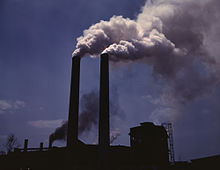air pollution
Killer Coal
Black lung has been the underlying or contributing cause of death for more than 75,000 coal miners since 1968, according to NIOSH, the federal agency responsible for conducting research on work-related diseases and injuries. Since 1970, the Department of Labor has paid over $44 billion in benefits to miners totally disabled by respiratory diseases (or …
Continue reading “Killer Coal”
CONTINUE READINGJustice Scalia’s Puzzling Dissent
Justice Scalia’s dissent in EME Homer contains a number of unusual lapses in substance and tone.
As I’ve been studying the opinions in EME Homer, I’m increasingly struck by the oddities of Justice Scalia’s dissent. There was a flap last week about his blunder, later quietly corrected, in describing one of his own past opinions. But that’s not the only peculiarity of the dissent. As a quick reminder, EME Homer involved EPA’s effort to deal with interstate …
Continue reading “Justice Scalia’s Puzzling Dissent”
CONTINUE READINGA Victory for Clean Air
The D.C. Circuit has upheld EPA’s regulation of mercury from coal-fired plants. We can all breath easier as a result.
EPA won an important victory in the D.C. Circuit today. In White Stallion Energy Center v. EPA, the court upheld EPA’s new regulations limiting mercury from coal-fired power plants. The main issue in the case was about a threshold requirement for regulation. Before setting limits on mercury from coal plants, EPA had to consider studies of …
Continue reading “A Victory for Clean Air”
CONTINUE READINGKing Coal’s Fading Grip
According to a new study from Duke, coal may be on the way out. as “[l]ow natural gas prices and stricter, federal emission regulations are promoting a shift away from coal power plants and toward natural gas plants as the lowest-cost means of generating electricity in the United States.” The authors estimate that “the economic …
Continue reading “King Coal’s Fading Grip”
CONTINUE READINGGina McCarthy to be nominated as EPA head
As predicted by Cara recently in this space, it’s being widely reported (for example here) this morning that Gina McCarthy, currently EPA’s Assistant Administrator for the Office of Air and Radiation, is Obama’s pick to succeed Lisa Jackson as EPA Administrator. Cara sees this appointment as a good thing for EPA’s climate policy efforts and …
Continue reading “Gina McCarthy to be nominated as EPA head”
CONTINUE READINGDeadly spike in Beijing’s air pollution
This graph shows recent air quality monitoring data (PM 2.5) from the U.S. Embassy in Beijing. As the New York Times noted, this spike—seen as a thick haze in the city—has been described as “postapocalyptic.” Thanks in no small part to the Clean Air Act, we have thus far avoided the need to walk around …
Continue reading “Deadly spike in Beijing’s air pollution”
CONTINUE READINGThe D.C. Circuit’s Activist Ruling on Interstate Pollution
About ten days ago, the D.C. Circuit struck down EPA’s effort to establish a cap-and-trade system for pollutants that cross state lines. Now that I’ve had a chance to read the lengthy opinion in EMR Homer City Generation v. EPA, I’m struck by the aggressiveness of the court’s intervention, which goes well beyond the customary …
Continue reading “The D.C. Circuit’s Activist Ruling on Interstate Pollution”
CONTINUE READINGIs King Coal in Decline?
This revealing graph from Wonkblog has some important lessons. First, power plants last a long time. Most of the generation fleet is twenty to sixty years old. Second, at this point, coal is basically a legacy fuel. It exists because it pays to keep old plants open. They are grandfathered and don’t have to use …
Continue reading “Is King Coal in Decline?”
CONTINUE READINGPublic Health and the Changing Electicity Mix
The electricity mix has changed dramatically, as discussed by my colleagues from the Haas School recently. The following chart tells the tale: Notice that the blue line (coal) is diving, while the orange line (natural gas) is picking up the slack. The change seems to be due to the rapid decline in gas prices. The …
Continue reading “Public Health and the Changing Electicity Mix”
CONTINUE READINGCalifornians and the Environment: PPIC’s New Survey Results
The Public Policy Institute of California this week released the results of its 12th annual “Californians and the Environment” survey. PPIC, a non-partisan think tank, always seems to be generating thought-provoking and cutting-edge scholarship focusing on the nation-state of California. Its latest environmental survey, based on recent polling of 2500 Californians, continues that tradition. The …
Continue reading “Californians and the Environment: PPIC’s New Survey Results”
CONTINUE READING





